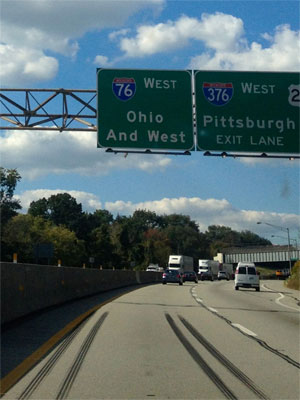Thanksgiving
Published 12 years, 2 months pastThis is an even more thankful holiday for us than usual. We’ve always been thankful for our good fortune, friends, and family, but it was two days ago that we got the strongest indication yet that our daughter Rebecca will live to see next Thanksgiving, and very possibly many more beyond that.
Tuesday morning we got up very early to deposit Carolyn and Joshua with friends, and then took Rebecca to Hillcrest Hospital for an MRI. This was our first interaction with the radiology staff there, though by no means the last, and Rebecca as usual charmed the socks off of everyone there. After she recovered from the anesthetic, we got lunch, picked up a few groceries, and then headed to the main campus of the Cleveland Clinic to get the results of the MRI.
To put it baldly, the results couldn’t have been any better. The MRI showed no sign of renewed tumor growth, no regions that appear abnormal, not even signs of swelling secondary to cancerous activity. This doesn’t mean that she’s cancer-free: nobody can say that with certainty. As I wrote two weeks ago and XKCD beautifully illustrated a couple of years ago, there can be never really be certainty except of the terminal kind, but what we have now are strong signs that Rebecca’s cancer actually can be eradicated. What that means is that instead of hospice, we can start a year of chemotherapy in an effort to make certain that the astrocytoma doesn’t return. The normalness of the MRI, and the particular pattern of side effects she experienced from the first round of chemotherapy, mean it’s reasonable to feel hope. As a friend put it, this isn’t the light at the end of the tunnel, but it means that there is a tunnel. A long and difficult tunnel, perhaps, but nevertheless a tunnel that might one day yield to daylight and open skies.
And so we’re thankful for the nurses and doctors that have shepherded us through one of the most harrowing periods of our lives. Without them, Rebecca would already be dead. We’re thankful for the medical research and science that made it possible to remove so much of the tumor and target any remaining cancerous tissue. Without them, Rebecca would be dying. Instead, she is still as sparklingly alive as ever, and we have hope again.
We‘re thankful that we have the means and the opportunity to fight for our daughter’s life. We’re thankful for family, who were there, and will always be there, when we need them. We’re thankful for all the people who have supported us through the past several months, bringing meals to our house, ferrying our kids to school and activities, and doing the organization work to make sure it all happened. We’re thankful for the Cleveland Animal Protective League, where we adopted a three-month-old shorthair tuxedo kitten yesterday. We’re thankful to be together under one roof, and not under a cloud of grief. We’re deeply, profoundly thankful.
A happy Thanksgiving to one and all, whether you celebrate a specific holiday today or not. May every day be an occasion to be thankful.
